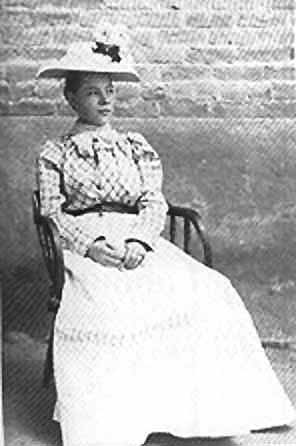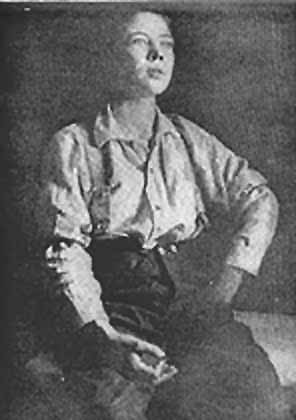
Pearl Hart

Pearl Taylor
1871--1925
Lindsay, Ontario, Canada
aka, Mrs. L.P. Keele
Born and raised in Lindsay, Ontario, Canada, to a middle-class and respectable family, Pearl Taylor was one of several children. She was sent to finishing school at an early age and, in 1888, at age seventeen, was seduced by a gambler, Frederick Hart. Pearl eloped with him, but marriage to Hart proved to be one hardship after another. Hart was a small time gambler and occasional bartender. Somehow he managed to scrape enough money together to take Pearl to Chicago to see the Columbian Exposition of 1893. There Hart became a barker for sideshows and Pearl worked odd jobs. She was thrilled at the Wild West shows and became enamored with the Old West, believing in all its legends and heroes.

Pearl left her ne'er-do-well husband abruptly and moved to Colorado where she gave birth to a son. She returned briefly to her home in Lindsay to leave the child in the care of her mother. She then went to Phoenix, Arizona, where she quickly discovered that the Old West was no more...and most likely never existed. To survive, Pearl cooked in a lunch room and took in laundry. In late 1895 Hart showed up and begged her to return to him, promising that he would get a job. He worked as a bartender and hotel manager. For three years there was domestic peace; and a second child, a girl, was born.
In 1898, Hart told Pearl that he was tired of supporting her and the child. During a fight, he knocked her unconscious and left, joining the army and going off to fight the Spanish in Cuba with Teddy Roosevelt's Rough Riders. Pearl took her second child to her home in Canada and then drifted back to the western mining camps. She worked in these hellholes as a cook until taking up with a carefree miner, Joe Boot. In 1899, Pearl received a letter from her brother telling her that her mother was ill and needed money for medical attention. Desperate, she talked to Boot about her dilemma. Boot suddenly had the idea to rob the Globe, Arizona, stage.
Boot said the stagecoach that ran between Florence and Globe always carried salesmen who had hundreds of dollars and that, since no one had robbed a stage in years, it carried no shotgun rider, only an unarmed driver. The stage run was one of the last in Arizona Territory. Pearl agreed to rob the stage with Boot, and the two rode to a watering hole where they knew the stagecoach would stop to rest the horses. Pearl, dressed as a man, was armed with an old .44 Colt. Boot carried a .45 caliber six-gun.
When the Globe stagecoach appeared, Pearl and Boot jumped in front of it, holding their guns on the driver. They ordered him to halt. Boot trained his weapon on the driver while Pearl ordered the passengers to step from the stage and line up. After she took the driver's six-gun, Pearl held her gun on the passengers and collected their money, about $450. Then acting out the part of the Western badman, she peeled off three $1 bills from the stolen money and gave a bill to each of the tree passengers, saying: "For grub and lodging." They were then ordered back into the coach and the stage resumed its journey while Pearl and Boot mounted their horses and rode into the hills. The daring bandits had given little thought to their escape. They promptly got lost and after wandering about in the wild for several days, fell asleep next to a large campfire. Possemen roused them from their slumbers and put them under arrest.
Pearl Hart played her part as the lady bandit to the hilt, telling the smiling lawmen that they would never have taken her alive if she had gotten to her gun. They agreed, and then took her and Boot to jail. Pearl became an overnight celebrity as the last bandit to rob a stage. The fact that she was a woman made her even more of a curiosity, drawing crowds of admirers to the Globe jail to collect her autograph. She strutted behind the bars of her cell, playing the part of the outlaw. Sometime later, with another prisoner, Ed Hogan, Pearl escaped. When she was recaptured some days later, Pearl again played the part of the desperado.
Before her trial on charges of highway robbery, Pearl Hart made a flamboyant suicide attempt, one that was obviously intended to glean headlines, not insure death. While one of her guards stood in front of her cell, she suddenly cried out that she did not care to live any longer and threw a white powder into her mouth, then collapsed. A doctor was rushed to her cell and, after examining her, shook Pearl and shouted: "Stop pretending, Pearl, and get up." As her eyes blinked open, the physician said: "No one ever killed themselves by swallowing talcum powder, Pearl."
Her trial took place in Florence, but Pearl insisted that no court had the right to place her on trail, loudly stating: "I shall not consent to be tried under a law in which my sex had no voice in making." Thus, Pearl Hart became one of the first champions for women's rights, giving interviews and urging her fellow females to revolt against laws of the land until they were given the right to vote. Public sentiment was in favor of Pearl, who was tried separately from Boot. After listening to her lawyer plead that this was he first offense and that she had struggled all her life to obey the law, the jury retired and returned in fifteen minutes to acquit her.
Judge Doan was furious and ordered another jury impaneled immediately to try Pearl on stealing the six-gun from the driver of the stage. Judge Doan warned the members of the second jury that they should not allow their natural sympathies for a women to cloud their reason. The all-male jury listened to the case and in ten minutes found Pearl guilty. The judge then sentenced the lady bandit to five years imprisonment at the Territorial Prison at Yuma "to cure her of robbing stagecoaches." Joe Boot, in a separate trial, was convicted of highway robbery and sentenced to the same prison for thirty years. Reporters rode the train with Pearl to Yuma, filing colorful accounts which detailed her every move and utterance, including the fact that she smoked cigars during the trip and livened up the journey with her "salty conversation."
A special cell was prepared for Pearl, separating her from the all-male population. Within a few weeks, Pearl began to spread the gospel, giving fellow prisoners long lectures on their sinful ways and how crime does not pay. She continued this evangelistic campaign for a year and a half until scores of Arizona citizens, hearing of her newly found religious beliefs, petitioned for her release. She was set free along with another female prisoner, Rosa Duran, on Dec. 19, 1902, after serving eighteen months. Governor A.W. Brodie released these two women on the grounds that the state prison had no accommodations for women, but he was really bowing to overwhelming public pressure to release Hart.
Pearl left for Kansas City where she joined her sister who had written a play about her, and Pearl starred in this dime novel production which was titled The Arizona Bandit. The play closed after a short run and Pearl disappeared. She was arrested under the name of Mrs. L.P. Keele, in Kansas City two years later for buying stolen canned goods and given a brief jail term. Again Pearl disappeared and was not seen again until 1924 when she returned to Arizona and inspected the courthouse where she had been tried, smiling and telling an attendant that "nothing has changed". When the attendant asked who she was, she turned in the doorway and dramatically stated: "Pearl Hart, the lady bandit.
She was thought to have died in 1925 in Kansas City while operating a cigar store but other reports have it that she moved to the far West, perhaps to San Francisco, where she lived until the mid-1950s.

THE LADY BANDIT


Top of Page
Copyright 1999 LaVone Luby -- All Rights Reserved
Site Design 1997 by Carol Tallman Jones -- All Rights Reserved
|